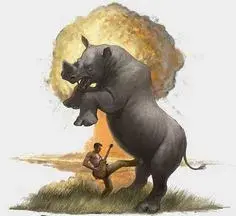I’ve spent more than 7 years in Mastodon, and in my experience, new users always come in with a Twitter mindset, then getting a cultural shock because they come to Mastodon expecting a Twitter experience and end up finding something strange and bizarre.
To soften the blow, I’d like to explain the cultural differences between Mastodon and Twitter.
What Twitter was:
- You could follow microcelebrities (or “influencers”) to read interesting things
- You didn’t reach people unless you got lots of likes quickly, so it became a popularity contest
- The algorithm decides what you read and how you engage, even if it’s negative content or something bad for your mental health.
- Toxic people drew others to quote posting, so it became a yelling competition. You didn’t build community, you built followers by standing on a platform and holding a megaphone.
- Unpopular users just yell to the void.
What Mastodon is:
- A bunch of communities of people with diverse interests and real lives.
- Mastodon servers (instances) are careful of who they federate with. Some servers just moderate poorly and there are too many assholes.
- There are microcelebrities, but they’re NOT looking to be popular. They just post the things they do; they’re popular because their lives / hobbies are interesting.
- In Mastodon, you reach people who are actually interested in your stuff. You don’t need to game an algorithm. There is no algorithm, people ARE the algorithm.
- If you don’t want to engage with someone, you can block and report. Unlike Twitter, Mastodon admins do take reports seriously (unless it’s one of the big instances; then good fucking luck). Reporting is encouraged on Mastodon, it keeps the community clean.
- Because admins often maintain the server using their own money, it’s in their best interest that the community is healthy. (Unless they’re assholes, but their instances get blocked quickly)
- There are no quote posts. You can paste a link to the other person’s post, but it is discouraged because we know where that leads.
Longer explanation:
Mastodon has an entirely different culture compared to Twitter. Mastodon was founded and populated by people who believed Twitter was too toxic and corporate-driven. Mastodon is full of gays, transgender folks, sex workers, artists, furries, autistic people, etc.
These people were driven out of the big platforms (Facebook, Twitter) by hate and discrimination. These people have experienced sexism, homophobia, transphobia, ableism, body shaming, etc. in their lives. It follows that the majority of Mastodon is left-leaning, anti-conservative, communist and anti-corporate.
Furthermore: Because it started (or quickly became) as a sort of safe haven for queer folks, they were more open to sincere posting. They post their problems, the discrimination they’ve experienced; their body dysphoria; depression; homophobia; transphobia and racism. And they give each other support, even economic. In my timeline I see posts asking for emergency money more than once per day.
If you wonder why this doesn’t appear on Twitter, it’s because the Algorithm filters them out. The public, the customers don’t like hearing about people asking for money not to get evicted. They don’t like to hear how people were harassed the other day by some karen who believes they’re a man in disguise.
But Mastodon is different. People talk about their daily lives because they know their followers will receive 100% of their posts. This is how communities are built.
Mastodon is not, and never aimed to be a Twitter replacement. It was meant to be something different; a place where you could form communities and build connections without Big Brother examining you or deciding how you should behave online.
So the next time you look for “interesting people to follow”, it could be possible that you’re entering Mastodon with a Twitter mindset. No Toto, we’re not in Kansas anymore.
Start following people you think are interesting in YOUR instance. Then start seeing their boosts and follow people you think are cool. Little by little, expand your network, prune your follows and block / mute people you think are obnoxious, and keep building and shaping your network like a beautiful bonsai tree.
The time you invest on building a network from scratch is worth it: You will meet many interesting people, and you will meet new friends; real friends, not just a series of followers whom you have to entertain.
I guess I never used Twitter as “intended”. I always just cultivated my follow list and watched the people I was following, and looked at the ppl they were replying to & retweeting to identify new people to follow.
For me, Mastodon has been much the same.
I feel like this post is basically saying “our hammer isn’t a hammer because we put a really nice grip on it and it’s being wielded by a very nice person”. At the end of the day, it still drives a nail.
Just because there’s a cultural difference doesn’t mean it isn’t the same type of social media tool. Simply call it a better form of Twitter and be done with it.
Yep. And the claim that there are not celebrities, or that if there are they are only popular because they’re sharing their interests, is comical. Whenever I pull up the main popular feed it’s the same slew of people that would have been copied to reddit on PoliticalHumor (Qasim Rashid, George Takei, etc.) sharing snarky political takes fiending for views.
I don’t even necessarily disagree with them most of the time, but it’s clearly the same type of celebrity engagement that Twitter has.
What you are describing about Twitter wasn’t my experience with it at all. I just followed my friends, interesting people I met at events, etc. I wasn’t looking to be connected to influencers or whatever was the popular chatter of the moment, and I freely used the block feature to filter out people who posted stuff I wasn’t interested in. It worked just fine like that. Decent experience (too shallow for my preference, due to the nature of the platform, but not unpleasant).
I feel like most social media platforms are, to a large extent, what you make of them. Like my Facebook feed is pretty nice. It’s about 60% family and friends that I like, 20% interest groups (kayaking and hiking mostly), and 20% ads for stuff I’m interested in (mostly authors right now). There’s none of the toxic bullshit that a lot of people complain about.
So yeah, I agree with the ‘follow people you are interested in’ advice, but that’s not unique to Mastodon or Lemmy or whatever.
It’s only that because of the amount and type of people in there. If celebrities would join to Mastodon and their followers with them this would change. Which could be good. I have Mastodon and I think I follow good people. But I do miss some of those hits tweets that were so good that made me shown them to irl people.
I do understand the need/desire for some people of smaller semi-closed communities. But some people want also something big, with the good things that come with big communities.
Also I don’t know how many people are there with a single interest in life. But I least I have so many interests that I could not choose a instance by their supported interest or community, because I would be missing a lot of things from other interests I had. That’s why I mad account in generalist instances, hopping that they are federated with as much other instances as possible.
That’s why I support more federation integration in the fediverse.
If celebrities would join to Mastodon and their followers with them this would change.
I’ve seen a few big names joining and then disappearing almost immediately. Some of those who remain active are Mark Ruffalo, Neil Gaiman, George Takei and a few other authors I like.
Your title is misleading.
Mastodon can be and should be the new Twitter, in that it’s the new place/facility for people to be able to microblog each other.
But it shouldn’t become the harsh/bad environment for conversation that Twitter currently is, which is what you’re speaking to (if I’m understanding you correctly, from what I just read).
Don’t snatch defeat out of the jaws of victory, with post titles like this. You only get one chance of getting people to move over from one social platform to another.
It all depends on what Twitter is to you.
To me, it’s short fleeting conversations I see with others and can be up to the second in its recency with events. I don’t care if I miss what someone said 17 hours ago
Mastodon does that well, just like Twitter did. It avoids the shit pretty well, which Twitter doesn’t do well.
It depends on what Twitter means to all of us, not just to you or me, individually.
You want to win the war, or you want to just F around? You decide.
The algorithm decides what you read and how you engage, even if it’s negative content or something bad for your mental health.
This may be the wrong place to post this, but it’s something I’ve been thinking about for a while. “Algorithm” isn’t a dirty word. And in fact, IMHO Mastodon could benefit from a few alternatives to its most-recent-first algorithm.
For instance, I might want to see posts by emergency services in my area first, followed by posts by friends, and posts by a bot that posts a cat picture every minute further down. Or someone might be going off on a rant, and I’d like to turn their firehose of posts down to a trickle for a few hours. Or maybe I’d like Mastodon to just stop showing me anything after a few hours of activity, to encourage me to take a break.
The reason Twitter’s, Facebook’s, algorithms are evil is that they encourage you to do things you wouldn’t want to do, and because they show you content you don’t want. Not because they’re algorithms.
In a perfect world, every user on every instance would be able to choose how posts are presented. But that may be too computationally expensive, especially for large instances, especially when you start trying to figure out things like the mood of a post. But maybe each instance could decide which algorithm it wants to use, and user can migrate from one instance to another, depending whether they like how things are presented.
There are no quote posts. You can paste a link to the other person’s post, but it is discouraged because we know where that leads.
“We” don’t. Please elaborate.
Ars Technica recently published an article very critical of Mastodon. The main takeaway is the argument that Mastodon won’t scale well to a large userbase, as the more instances there are, the bigger the server burden to everyone. And as most users are against corporate funded instances (they’d defederate from any that emerge), it may be unsustainable mid/long-term.
I wonder if these scaling-issues apply to Lemmy too? The instances make copies of posts/comments from other instances. They copy images too? And videos? If so, I imagine a future where only the bigger and wealthiest instances will survive.
And concerning moderation tools, I know they’ll improve with time. But how can a federated system like Lemmy do certain tasks that Reddit’s Pushshift enabled? Example: bots detecting and deleting re-posts, spam, bad actors across multiple communities, etc.
Mastodon does not need to scale well. Even if the userbase shrinks to what it was before the Big Twitter Exodus (or whatever you want to call it) of last year, it will be perfectly alright.
Mastodon was fun and enjoyable before. It does not need more users to remain so.
I’m not a fan of the “community” aspect of much of the Fediverse. I have more than one interest. My entire persona isn’t just one thing. I don’t want to log in to a different account every time I want to talk about something different.
I just join a generic-ass instance (mas.to on Mastodon, lemmy.world on Lemmy), and follow the stuff that actually interests me. (hashtags & a couple users on Mastodon; communities on Lemmy)
Following literally everything that gets farted into an entire instance is just drinking from a firehose.
This was the reason I ended up hosting my own general use instance. It’s mostly for my own benefit, but I also wanted to make something open to users that want to have a nice, short username with a silly URL.
I also bailed on mas.to, and made my own single-user instance…
Please take the below as said with the most respect. Especially as I am very empathetic of the struggle of communities finding a space away from hate.
My … concern is:
What you describe is … Reddit / Threadiverse model. Small tight communities focused on openly discussing niche topics. This is why I am on Lemmy.
I use mastodon as “microblogging” - public posting on topics of interest and honestly as an RSS feed since many news orgs’ Twitter feeds are ported over to masto.
But my problem is. If mastodon is a place where we form tight private communities. … and Lemmy is a place where we form tight private communities …, and kbin is a place where we form tight private communities … why do we have all three? What is the difference?
We need fediverse software with clarity of purpose. And the purpose you described … does not fit at all to me with the way things, like replies, seem to work in Mastodon.
Does that make sense?
(And I fully admit I may completely be wrong in this opinion)
I’ve been using Mastodon since Twitter was taken over by Musk, so I’m not a super long-term user, but I can give my perspective:
Platforms like kbin / lemmy are more like “topic” communities. Like people on kbin create “magazines” and on lemmy they are actually “communities”. From the user perspective, you can just look for these communities you are interested in and sign up to get updates from them.
Platforms like Mastodon are more like you and specific people you like to see content from. So you find people you like to hear from and you follow them to get their updates. They may post on subjects you aren’t interested in but oh well, that’s up to them.
Both formats can produce desirable, tight-knit communities, but they just use different structure. In my opinion, the kbin / lemmy style is more accessible in terms of finding people interested in a specific subject but feels less personal since you are just all there to talk about a specific subject. On Mastodon, when I find people posting content I like, I end up learning more about the random nonsense they are interested in. Like my feed there has a ton of moose pictures now because one person I followed likes to post pictures of moose. I don’t mind seeing them, but I never expected to see so many moose.
TLDR: Mastodon is about following people, kbin / lemmy are about following topics.
The difference between Lemmy and Mastodon, is that the former is topic centric. There are subreddits and each post is topic specific. Mastodon is people centric. You’re not on Mastodon to see what’s happening around the world or what interests you, you’re on Mastodon to see what your friends are up to. It’s the difference between going to the public plaza and going to an expo.
If you have to write a long ass post telling users that they’re using your software wrong, then you wrote bad software.
Don’t want people to think it’s supposed to be Twitter? Don’t model the entire UX after Twitter.
You’re missing OP’s entire point. The two platforms are completely different. You see, Twitter is a microblogging platform, but Mastadon is a microblogging platform. They’re as different as Word and Pages, or Excel and Sheets, or Photoshop and GIMP. Just entirely, utterly different in every way, with the sole exception being that they are functionally identical. (-:
The sane take.
I see you point but I think you are being harsh here. It is clear that it is not to be taken literally that Mastodon is nothing like Twitter in therms of looks. I think the spirit of the OPs comment is that it is the style of conversations, atmosphere and culture that each of them foster what makes them somewhat different.
If Mastodon became as popular as Twitter it would end up with at least part of it being almost the same as Twitter. The main reason for the differences are that very different types of people are using the two platforms currently.
Those sounds cool! I may have to check it out. Does it matter what instance you join?
In my opinion, you should start out by joining one of the bigger instances. Once you are used to Mastodon, you may if you wish, move to a smaller server that is focused on your niche or your specific interests. But whichever instance you join, you can curate your timeline by following the right hashtags along with people.
I apparently have always used Twitter wrong since I mostly just lurk and people I follow don’t get into flamewars or whatever they’re called. It’s kinda unrecognizable for me how you describe Twitter.
Mastodon on the other hand is just pretty dead for me. I haven’t found that much interesting stuff and I don’t really know where to look.
From my perspective, they function pretty similarly. I don’t see the toxicity you’re talking about. Quote tweeting is handy because it’s not used to put down others but just, you know, sharing and adding something to the original tweet.
I can definitely agree, Mastodon feels empty and there’s not alot to look out for
I like Mastodon, it’s fun, I can find pretty reliable information about a breaking news topic, and there are some cool people you can follow. But I really dislike furries and hate seeing their content. It’s like for every 10 cool people, there is a furry. Sometimes, a post will get boosted that I like. I go to their page and it ends up being a lot of furry porn/art. I really, really don’t want to see it, ever.












